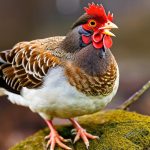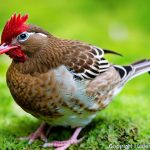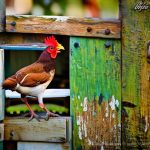Chickens have specific requirements for their well-being during winter. These include:
1. Warmth: Chickens need protection from cold temperatures to prevent frostbite and maintain body heat.
2. Shelter: A dry, well-insulated coop is essential to shield chickens from wind, rain, and snow. 3.
Ventilation: Proper air circulation in the coop prevents respiratory issues caused by excess moisture and ammonia buildup. 4. Nutrition: Chickens require increased caloric intake during winter to generate body heat.
5. Water: Unfrozen water must be available at all times for hydration and digestion. 6.
Light: Adequate lighting is necessary to maintain egg production and overall health. 7. Space: Sufficient room prevents overcrowding and reduces stress.
8. Bedding: Clean, dry bedding helps insulate the coop and keeps chickens comfortable. 9.
Protection from predators: Winter can make chickens more vulnerable to predators seeking food. 10. Regular health checks: Monitoring for signs of illness or frostbite is crucial in cold weather.
Different chicken breeds may have varying levels of cold tolerance. Factors such as age, overall health, and flock size can also influence winter care requirements. Understanding and addressing these needs helps ensure the flock’s health and productivity throughout the cold season.
Table of Contents
- 1 Providing Proper Shelter and Insulation
- 2 Using Heat Lamps and Heating Pads
- 3 Ensuring Proper Ventilation
- 4 Providing Adequate Bedding and Nesting Material
- 5 Offering Warm and Nutritious Food and Water
- 6 Monitoring and Adjusting as Needed
- 7 FAQs
- 7.1 How can I keep my chickens warm during winter in Utah?
- 7.2 What should I consider when building a coop for winter in Utah?
- 7.3 Are there specific breeds of chickens that are better suited for cold weather in Utah?
- 7.4 Should I use heat lamps or heated pads to keep my chickens warm during winter in Utah?
- 7.5 What should I feed my chickens during winter in Utah?
Key Takeaways
- Chickens need extra care in winter due to their susceptibility to cold temperatures
- Proper shelter and insulation are essential to protect chickens from harsh weather conditions
- Heat lamps and heating pads can be used to provide additional warmth in the coop
- Proper ventilation is crucial to prevent moisture buildup and maintain air quality
- Adequate bedding and nesting material help chickens stay warm and comfortable
- Offering warm and nutritious food and unfrozen water is important for the health of chickens in winter
- Regular monitoring and adjustments are necessary to ensure the well-being of chickens in winter
Providing Proper Shelter and Insulation
Building a Well-Insulated Coop
A well-built coop is essential for protecting your flock from the cold and harsh weather. The coop should be insulated to retain heat and keep out drafts, but it should also be well-ventilated to prevent moisture buildup, which can lead to respiratory issues.
Additional Coop Considerations
The coop should be raised off the ground to prevent dampness and provide a dry environment for the chickens. It’s also important to ensure that the coop is free from drafts and leaks, as these can make it difficult for chickens to stay warm.
Proper Bedding for Winter Comfort
In addition to a well-built coop, providing proper bedding is essential for keeping chickens warm in the winter. Deep bedding made of materials such as straw or wood shavings can provide insulation and help regulate the temperature inside the coop. Nesting boxes should also be filled with clean, dry bedding to provide a warm and comfortable place for hens to lay their eggs.
By providing proper shelter and insulation, you can help your chickens stay warm and comfortable throughout the winter months.
Using Heat Lamps and Heating Pads

In some cases, especially in extremely cold climates, additional heat sources may be necessary to keep chickens warm in the winter. Heat lamps can be used to provide supplemental warmth in the coop, especially during particularly cold nights. It’s important to position heat lamps safely to prevent fires and burns, and they should be used in conjunction with proper insulation and bedding to ensure that the coop stays warm without becoming too hot or dry.
Heating pads designed specifically for poultry can also be used to provide warmth without the risk of fire associated with heat lamps. These pads can be placed under nesting boxes or in other areas where chickens tend to gather to provide a cozy spot for them to stay warm. While heat lamps and heating pads can be useful tools for keeping chickens warm in the winter, it’s important to use them with caution and monitor their use closely.
Improper use of heat lamps can pose a fire hazard, and heating pads should be checked regularly for signs of wear or malfunction. Additionally, it’s important to ensure that chickens have access to cooler areas within the coop so that they can regulate their body temperature as needed. By using heat lamps and heating pads responsibly, you can provide your chickens with the extra warmth they need to stay comfortable during the winter months.
Ensuring Proper Ventilation
Proper ventilation is crucial for maintaining a healthy environment for chickens in the winter. While it may seem counterintuitive to allow fresh air into the coop during cold weather, good ventilation is essential for preventing moisture buildup, which can lead to respiratory issues and frostbite. Ventilation also helps regulate the temperature inside the coop, preventing it from becoming too hot or too cold.
To ensure proper ventilation, coop windows or vents should be opened slightly to allow fresh air to circulate while still protecting chickens from drafts. It’s important to monitor the coop for signs of condensation or excessive moisture, as this can indicate a ventilation problem that needs to be addressed. In addition to natural ventilation, supplemental ventilation such as exhaust fans or air vents can be installed in the coop to help regulate air flow and prevent moisture buildup.
These systems should be designed to provide adequate air exchange without creating drafts or allowing cold air to enter the coop. By ensuring proper ventilation, you can help maintain a healthy environment for your chickens throughout the winter months.
Providing Adequate Bedding and Nesting Material
Adequate bedding is essential for keeping chickens warm and comfortable in the winter. Deep bedding made of materials such as straw or wood shavings provides insulation and helps regulate the temperature inside the coop. It also provides a soft and comfortable surface for chickens to walk and rest on.
Nesting boxes should also be filled with clean, dry bedding to provide a warm and cozy place for hens to lay their eggs. It’s important to regularly clean and replace bedding as needed to prevent moisture buildup and maintain a healthy environment for your flock. In addition to bedding, providing nesting material such as straw or shredded paper can help keep eggs warm and protected from the cold.
Hens will use this material to line their nests and keep their eggs insulated during incubation. By providing adequate bedding and nesting material, you can help your chickens stay warm and comfortable throughout the winter months.
Offering Warm and Nutritious Food and Water

Chickens require special care during the winter months to stay healthy and comfortable. Providing them with the right food and water is crucial to their well-being.
Nutritious Food for Energy
Chickens need extra energy to stay warm in cold weather, so it’s essential to provide them with warm and nutritious food throughout the winter months. Feeding a high-quality layer feed supplemented with grains such as corn or oats can help provide chickens with the extra energy they need to stay warm. Additionally, offering scratch grains or mealworms as treats can help keep chickens active and generate body heat.
Fresh and Accessible Water
It’s also important to ensure that chickens have access to fresh water at all times, as they require hydration to stay healthy in cold weather. In extremely cold temperatures, it may be necessary to provide warm water to prevent it from freezing. Heated waterers or adding hot water to waterers several times a day can help ensure that chickens have access to liquid water throughout the winter.
Maintenance and Hygiene
It’s also important to regularly check waterers for ice buildup and clean them as needed to prevent contamination. By offering warm and nutritious food and water, you can help your chickens stay healthy and comfortable during the winter months.
Monitoring and Adjusting as Needed
Throughout the winter months, it’s important to monitor your chickens closely and make adjustments as needed to ensure their health and well-being. Regularly checking on your flock allows you to observe their behavior and condition, which can indicate whether they are comfortable or experiencing any issues related to the cold weather. It’s also important to monitor the temperature inside the coop and make adjustments as needed to maintain a comfortable environment for your chickens.
In addition to monitoring your flock, it’s important to regularly inspect the coop for signs of drafts, leaks, or other issues that could impact its ability to keep chickens warm and dry. Making repairs or improvements as needed can help ensure that your flock stays comfortable throughout the winter months. By monitoring your chickens and their environment closely, you can make adjustments as needed to ensure that they stay healthy and happy during the winter months.
In conclusion, caring for chickens in the winter requires an understanding of their specific needs and taking proactive steps to ensure their health and well-being. Providing proper shelter and insulation, using heat lamps and heating pads responsibly, ensuring proper ventilation, providing adequate bedding and nesting material, offering warm and nutritious food and water, and monitoring and adjusting as needed are all essential aspects of caring for chickens in cold weather. By addressing these needs, you can help your flock stay healthy and comfortable throughout the winter months.
If you’re looking for tips on keeping chickens warm during the winter in Utah, you might want to check out this article on The Chicken Coop Country Diner. It offers valuable insights on how to create a cozy and insulated coop for your chickens to stay warm and comfortable during the cold months.
FAQs
How can I keep my chickens warm during winter in Utah?
To keep your chickens warm during winter in Utah, you can provide them with a well-insulated coop, use heat lamps or heated pads, and ensure they have access to fresh water and high-quality feed.
What should I consider when building a coop for winter in Utah?
When building a coop for winter in Utah, consider using insulation, sealing any drafts, providing adequate ventilation, and ensuring the coop is predator-proof. It’s also important to provide roosting bars and nesting boxes for the chickens.
Are there specific breeds of chickens that are better suited for cold weather in Utah?
Yes, some chicken breeds are better suited for cold weather in Utah, such as the Rhode Island Red, Plymouth Rock, and Orpington. These breeds have thick feathers and are more cold-hardy.
Should I use heat lamps or heated pads to keep my chickens warm during winter in Utah?
Both heat lamps and heated pads can be used to keep chickens warm during winter in Utah. It’s important to follow safety guidelines and ensure that the heat source is securely installed to prevent any fire hazards.
What should I feed my chickens during winter in Utah?
During winter in Utah, it’s important to provide your chickens with a high-quality feed that is rich in protein and nutrients. You can also supplement their diet with scratch grains, mealworms, and fresh fruits and vegetables. It’s important to ensure they have access to fresh water at all times.

Meet Walter, the feathered-friend fanatic of Florida! Nestled in the sunshine state, Walter struts through life with his feathered companions, clucking his way to happiness. With a coop that’s fancier than a five-star hotel, he’s the Don Juan of the chicken world. When he’s not teaching his hens to do the cha-cha, you’ll find him in a heated debate with his prized rooster, Sir Clucks-a-Lot. Walter’s poultry passion is no yolk; he’s the sunny-side-up guy you never knew you needed in your flock of friends!
Meet Walter, the feathered-friend fanatic of Florida! Nestled in the sunshine state, Walter struts through life with his feathered companions, clucking his way to happiness. With a coop that’s fancier than a five-star hotel, he’s the Don Juan of the chicken world. When he’s not teaching his hens to do the cha-cha, you’ll find him in a heated debate with his prized rooster, Sir Clucks-a-Lot. Walter’s poultry passion is no yolk; he’s the sunny-side-up guy you never knew you needed in your flock of friends!







